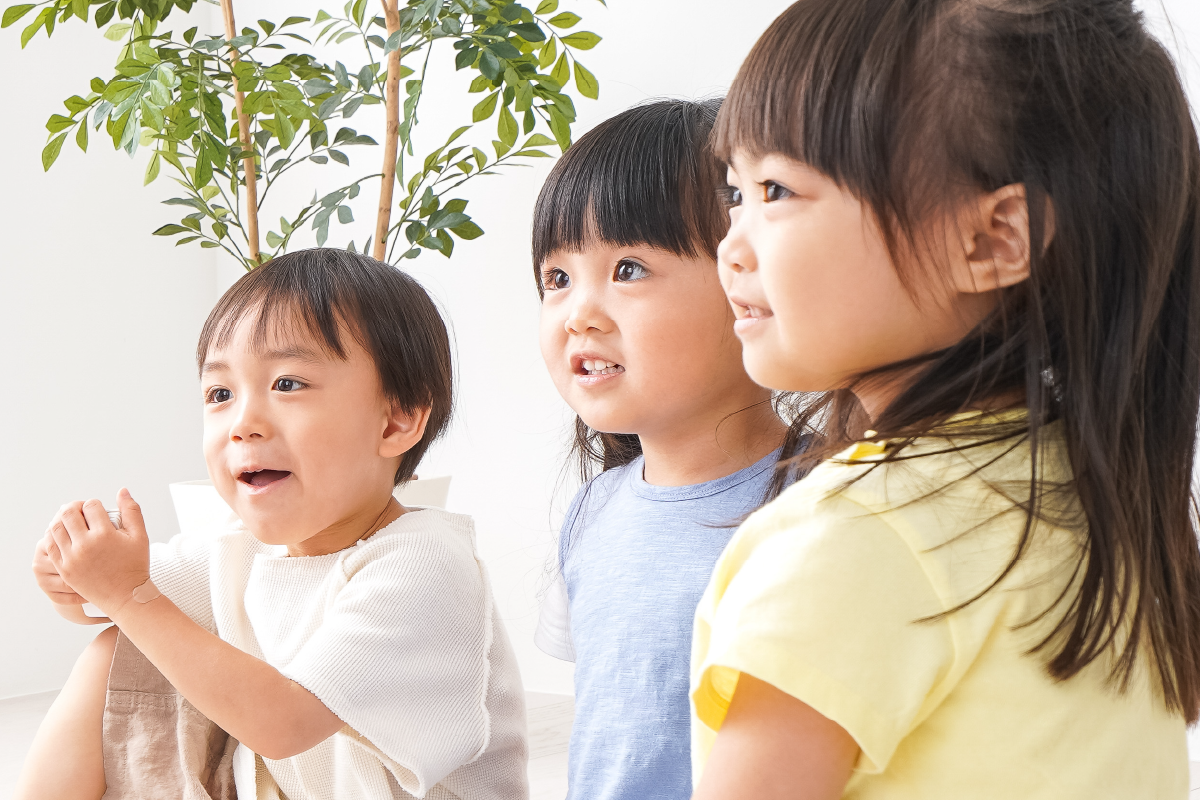モンテッソーリ教育とは?
モンテッソーリ教育は、イタリアの医学博士であり教育者でもあるマリア・モンテッソーリによって考案された教育法です。
「子どもは自ら育つ力を持っている」という考えのもと、子ども一人ひとりの個性と発達段階に合わせた環境を整えることで、自然な学びと成長を引き出していきます。
100年以上にわたり、世界各国で実践されてきたモンテッソーリ教育は、幼児期の「自立心」「集中力」「探求心」を育てる教育として、いま改めて注目されています。
当スクールでは、英語環境とモンテッソーリ教育を融合させ、国際的な感覚と豊かな人間性を育てることを目指しています。
モンテッソーリ教育の基本的な考え方
モンテッソーリ教育は、「子どもには、自ら学び育つ力がある」という信念に基づいています。
そのため、大人が一方的に教えるのではなく、子どもが自分で選び、自分で考え、自分で決める機会を大切にします。
特徴的なのは、「モンテッソーリ教具」と呼ばれる特別な教材を使って、感覚・言語・数・文化・日常生活などの分野を遊びのように体験できる点です。
これにより、知識だけでなく、集中力や責任感、自立心といった「生きる力」も身につけていきます。
教師(=指導者)は「教える人」ではなく、「見守り、援助する人」。子どもが安心して挑戦し、自分の力でできたという経験を積み重ねられるよう、静かに環境を整えています。
モンテッソーリ教育のメリットについて
モンテッソーリ教育には、子どもの内面に働きかける多くのメリットがあります。
- ・自立心が育つ
- 子どもが自分で選び、自分で決める体験を繰り返すことで、自立した人格が形成されます。
- ・集中力と忍耐力が養われる
- 子どもが選んだ活動に長時間取り組むことにより、集中力が自然と身につきます。
- ・自己肯定感が高まる
- 「できた!」という実感を積み重ねることで、自信と達成感が育まれます。
- ・社会性が自然に育つ
- 異年齢混合の環境の中で、年長児は思いやりやリーダーシップを、年少児は模倣と安心感を得ます。
- ・本質的な思考力が育つ
- 「なぜ?どうして?」に答える具体的な体験を通じて、論理的思考や創造性が深まります。
- ・過干渉を避ける教育
- 必要以上に指示や命令をせず、子ども自身が気づき、試行錯誤を経て学ぶ機会を大切にします。
このように、モンテッソーリ教育は単なる「幼児教育」の枠にとどまらず、子どもが一生涯を通じて役立つ力を身につけるための土台を築く教育法です。
マリア・モンテッソーリについて
マリア・モンテッソーリ(1870–1952)は、イタリア初の女性医学博士として知られ、のちに世界的な教育者として活躍しました。
もともと障害のある子どもたちの観察と指導から始まり、その中で「子どもは環境によって大きく成長が変わる」ことに気づき、すべての子どもに通じる教育法を築き上げていきました。
彼女のアプローチは、科学的観察に基づいており、子どもの発達段階に即した活動や環境の大切さを強調しています。
モンテッソーリの教育理念は、現在も世界中の家庭や教育機関で実践され、ノーベル平和賞候補にも3度ノミネートされるなど、その功績は今もなお高く評価されています。
What is Montessori Education?
Montessori education is a method developed by Maria Montessori, an Italian physician and educator.
Based on the belief that "children have the power to grow on their own," it creates an environment tailored to each child's individuality and developmental stage, fostering natural learning and growth.
Practiced around the world for over 100 years, Montessori education is now gaining renewed attention as a method that nurtures "independence," "concentration," and "curiosity" during early childhood.
At our school, we combine an English-language environment with Montessori education, aiming to cultivate both international awareness and rich humanity.
Core Principles of Montessori Education
Montessori education is founded on the belief that "children have the ability to learn and grow on their own."
Therefore, rather than adults teaching unilaterally, children are encouraged to choose, think, and decide for themselves.
One of the distinctive features is the use of special materials called "Montessori materials," which allow children to experience areas such as sensory perception, language, math, culture, and daily life in a playful way.
Through this, they not only acquire knowledge but also develop concentration, a sense of responsibility, and independence—skills essential for life.
The teacher (or "guide") is not someone who teaches, but rather someone who observes and supports. They quietly prepare an environment where children can feel safe to take on challenges and build experiences of success through their own efforts.
Benefits of Montessori Education
Montessori education offers many benefits that nurture a child’s inner development.
- ・Fosters independence
- By repeatedly experiencing choosing and deciding for themselves, children develop an independent personality.
- ・Cultivates concentration and perseverance
- By engaging deeply in activities they choose, children naturally develop focus and endurance.
- ・Builds self-esteem
- By accumulating the feeling of "I did it!", children gain confidence and a sense of accomplishment.
- ・Naturally develops social skills
- In mixed-age classrooms, older children learn compassion and leadership, while younger ones find role models and a sense of security.
- ・Encourages essential thinking skills
- Through hands-on experiences that answer "Why?" and "How?", children enhance their logical thinking and creativity.
- ・Education that avoids over-intervention
- Instead of giving excessive instructions or commands, children are given opportunities to notice, experiment, and learn through trial and error.
In this way, Montessori education goes beyond the realm of early childhood education and lays the foundation for lifelong skills that support a child's future.
About Maria Montessori
Maria Montessori (1870–1952) was known as the first female physician in Italy and later became a globally recognized educator.
Her work began with the observation and instruction of children with disabilities, through which she discovered that "a child's growth is greatly influenced by their environment." From this, she developed an educational method applicable to all children.
Her approach was based on scientific observation and emphasized the importance of activities and environments suited to a child’s developmental stage.
Montessori’s educational philosophy continues to be practiced in homes and institutions around the world today, and she was nominated three times for the Nobel Peace Prize—an enduring testament to her remarkable legacy.
